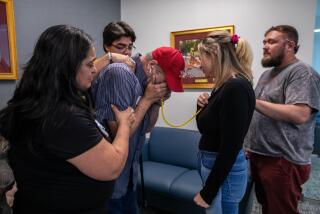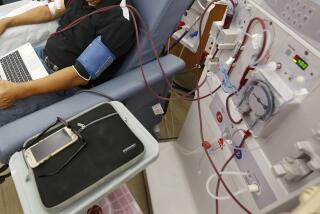Sell an organ, save a life
- Share via
ACCORDING TO RECENT reports, doctors at St. Vincent Medical Center in Los Angeles improperly transplanted a liver into a patient who was not at the top of the applicable waiting list. One person died who should have received the liver and didn’t; one person lived by jumping the queue and receiving a liver to which he was not entitled. This is a scandal, but a small one. The far larger scandal is that thousands die every year waiting for transplants in this country because of a misguided government policy.
Nearly 90,000 people are on waiting lists for organs in the United States, most hoping for a kidney or a liver, fewer in need of a heart or a lung or a pancreas. Time runs out for about 6,500 each year.
Only a small percentage of deaths occur in ways that yield organs useful for transplants. Even so, if all those organs were harvested, there would be enough to provide transplants for most of those who die waiting. One important reason for the shortfall is that federal law prohibits donors or their families from receiving any compensation for donations.
The law -- the National Organ Transplant Act -- is based on the perfectly pleasant idea that organ donations should be altruistic. Unfortunately, the reality is that most of us are not very altruistic. Only a minority of Americans put the tiny “donor” sticker on driver’s licenses or otherwise sign up to allow organs to be harvested and transplanted. Absent such prior assent, doctors are often reluctant to ask permission from the next of kin, and, when they do, the next of kin often refuse.
Some who choose not to be donors have a deep personal objection, religious or otherwise, to organ donation. Most people, however, fail to provide assent to donate because they don’t want to confront their mortality. And why should they, when there is nothing in it for them or their families? It is much easier just to ignore the issue.
Surely the shortage of organs for transplant could be alleviated if the law were changed to allow modest payments for harvestable organs of the deceased. A system for providing incentives could be organized in many different ways.
The government could give a small tax break, perhaps $20 off driver’s license renewal fees, to anyone who agrees to have organs harvested after death. The amount would be small because the organs may not be suitable for transplant. Alternatively, once a person has died, and doctors know that his organs are suitable, the next of kin could be paid a larger amount, perhaps a few thousand dollars, for the right to use those organs. The few who actually object to donating their organs can decline the inducements, while the many who have no strenuous objection will have an incentive to do the right thing.
Where would the money come from? The costs could be passed along to recipients, or more likely their insurance companies, Medicare or Medicaid. Transplant surgeries already cost tens or even hundreds of thousands of dollars (hospitals, doctors and other transplant service providers are legally permitted to make money on organ transplants), so paying for organs and administering such programs would not increase the total cost of transplants appreciably.
Two common objections to permitting payment for organs are that the poor would be disproportionately likely to sell their organs and then suffer ill health effects, and that the rich, who could best afford to pay for organs, would disproportionately benefit. But both of these pitfalls are easily avoided.
First, compensation should be permitted only for organs of the deceased. As long as the living are not paid for a kidney or a portion of a liver, there is no reason to fear a coercive organ market. In fact, such a policy could drastically reduce the number of Americans and other Westerners who, in desperate need of a transplant, travel to Third World countries where they can receive organs sold by living donors.
Second, organ procurement should remain separate from organ allocation. The government or transplant centers should act as the purchasing intermediary and continue to allocate harvested organs according to factors such as medical need, likelihood of a successful transplant and time spent on a waiting list.
Current law pays an unacceptably high price to indulge the moral intuition that human organs should not be bought and sold. The law should be more concerned with saving the lives of thousands who die needlessly.






